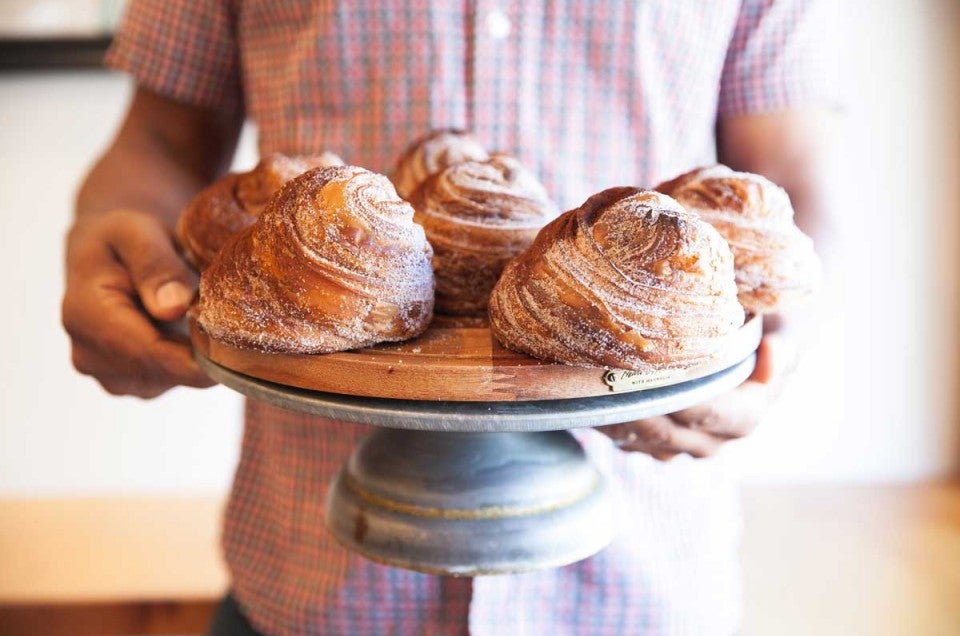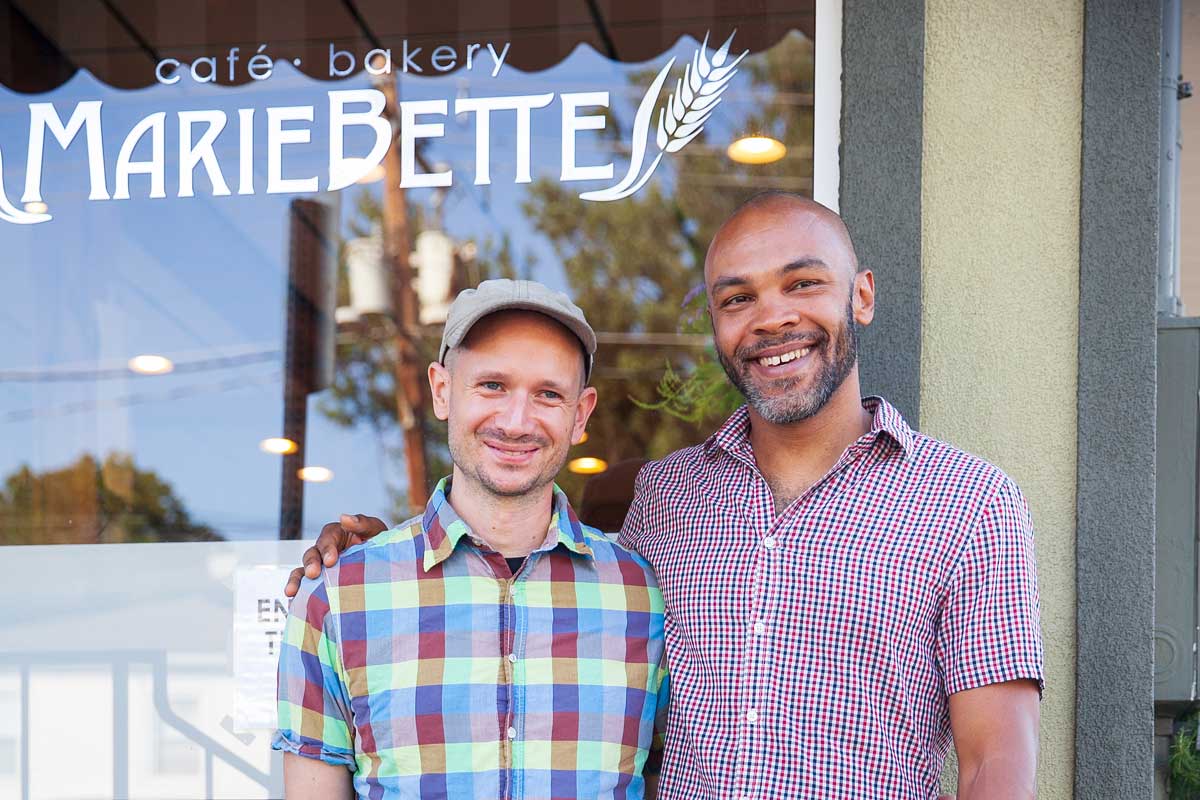For these bakers, Pride is about celebration and reflection
June is a joyous time to express their full selves.


 For cookbook author Jake Cohen, Pride Month is about many things — including eating. “I typically throw a Pride Shabbat every year,” he shares. “One year I had 125 people in my test kitchen, and it was just a huge celebration for queer Jews and queer and Jewish allies.” He adds, “I think there’s something really magical about the shared communal experience of nourishing a community of people.”
For cookbook author Jake Cohen, Pride Month is about many things — including eating. “I typically throw a Pride Shabbat every year,” he shares. “One year I had 125 people in my test kitchen, and it was just a huge celebration for queer Jews and queer and Jewish allies.” He adds, “I think there’s something really magical about the shared communal experience of nourishing a community of people.”
On this point, Cohen is in good company. “We always like to say that a bakery is the heart of a community,” says Jason Becton, who owns MarieBette with his husband Patrick Evans in their community of Charlottesville, Virginia. “People know us as the French bakery that’s owned by two gay men who are married and have two kids. There’s something kind of soft radical about that in a way, that we have just become a part of normal life for so many people in this town.”
This understanding that baking is about more than buttery pastries and colorful cakes is echoed by bakers from across the LGBTQ+ community. For Pride Month this June, we spoke to a few of them about the intersection of baking and identity, as well as how their baking embodies the same soft radical power that Jason references. Here's what each of them had to share, in their own words.
April: For me, Pride Month is a way of showing pride in who I am. That I am a same-sex loving person. That I’m proud of who I am, proud of my relationship, and proud to be a business owner. We definitely knew when we opened the bakery that we wanted it to be a community space, that we wanted to be welcoming and inclusive for everyone. And being an LGBTQ+ business, we wanted to make sure we put that at the forefront, that anyone can come into our space and feel welcome, addressed with the correct pronouns. Transgender people can come in and be respected and appreciated inside the space.

[We received an anti-gay customer order] last year in July, and it was very disheartening that a person went and took the time to troll our bakery, to see if we would deny him the cake because of the homophobic slur he wanted. The community really stepped up and showed support for us during that time. So it was a sad moment, but it also was a moment of pride because we got so much support. And I think that’s because the community, regardless of what they think or feel, they still love our bakery and love us as people.
Jenni: Pride empowers me to pursue my dreams and follow my passion, which is baking. During Pride Month, we make our signature rainbow pride cake. We also do a very special trans pride cake, which shows the beautiful colors of the trans flag.
We are a proudly LGBTQ+ owned and run establishment. In today’s scary and divided political climate, with communities struggling with the pandemic, we want to create a safe and welcoming space for everyone and spread a little bit of joy and comfort through our sweet offerings. We want our bakery to represent inclusivity, warmth, and most importantly, PRIDE.
Hadar: I’m a proud person regarding my queerness. Working in the culinary industry, I have found that it’s really important for me to state who I am and make my place, whether it’s a bakery or a restaurant kitchen, because I was almost shocked how few queer people I was interacting with in kitchens. I would go into these work environments and be the only queer person on the whole staff.

All the clients I’ve had since I officially started working with clients have been queer. Every single one of them. I think it’s a mixture of people wanting to be comfortable and also wanting to support their community. Multiple people have said they’ve found me because they were searching for queer chefs. I think it’s been a really positive thing for my career.
Jake: To me, it’s about having it be normalized to see a chef that happens to be queer. It’s just as simple as the fact that queer people don’t eat differently. We are just like everyone else. It’s just part of our identity. Seeing chefs who are creating incredible food and knowing that they are living an openly queer life, to me that is everything. [In my book Jew-ish], I’m normalizing this conversation of two gay men meeting, falling in love, blending families and recipes and traditions and gatherings, and no one’s blinking an eye. Because it’s completely normalized, and it’s completely surrounded by love and joy.
When I talk about how the queer community has looked out for me, I want to then pay it forward; to me, that is the baseline. I think going above and beyond is thinking about how are you going to pay it forward for the communities that don’t look like yours, because the queer community is so vast? How am I going to look out more for trans people, or gender non-conforming people, or queer women who have a much more difficult time when it comes to the restaurant industry?
Jason: Once I came out, I decided that the closet wasn’t ever going to be a place for me to be in again. It’s a liberating experience to be out and feel like you’re not hiding your true self. It's especially important to be visible for young people who see us as successful community leaders with a business. I think that’s important because when I was a kid, there weren’t as many examples of that to look up to.

During Black History Month and Pride month we put stencils on our bread of different Black Americans or different LGBTQ+ people from history and the present day to celebrate them and educate our community. Last year we featured Danica Roem, who was the first transgender person in the Virginia state Congress. We’ve had Bayard Rustin on our bread, who worked in the ’60s with Martin Luther King Jr. but was not in the spotlight because he was gay.
Sicily: For me, Pride is about celebration. But for a lot of us, it’s also about resilience and strength. Because that’s what it was rooted in, quite frankly: the fight back. I’ve always been very aware that I live in three realities: the reality of being a woman, the reality of being Black, and the reality of being queer. So Pride and Juneteenth coming together, it just really makes me feel hopeful and brings me love and joy in my community.
I think if we’re super particular about celebrating who we all are, down to the micro things, if we’re very particular about my race, sexuality, and identity as well as yours … if we can normalize that, then we can change the world. If we become very particular about how people are beautiful and how we celebrate them, it normalizes who people are.
Sana: This is a month when we all deserve to be visible, regardless of how or when we came out. Pride is really a hard-fought time to claim space. I think as a business owner, it feels like a time that I can bring my full self to the industry, this month of being like “I’m gay, hi!” Really, it’s about joy. And it’s about owning who you are. Those sound like such cheesy things, but I know that to teenage me, knowing that I deserve joy and to be whoever I wanted to be was something I didn’t know was possible.

As a business, we’re a 60% queer team; we’re from all kinds of different identities and backgrounds. I initially started this business knowing that I wanted to be a queer business, but I didn’t know what that meant. In 2016, nobody was saying that. We got a lot of hate for that. I think now that we have this team, it really feels like this is why I stuck to that word. I wanted to create space for people like me to bring their whole selves to work. My team is incredible, and I think they’re so incredible at their job because in a lot of ways, they feel fully seen. They have a place where all their identities are welcome.
This Pride Month (an observance in celebration of lesbian, gay, bisexual, transgender, and queer people, as well as other identities), King Arthur Baking Company is raising awareness for The Trevor Project, the leading national organization providing crisis intervention services to LGBTQ+ young people under 25. We've donated to The Trevor Project and we encourage you to do so as well: www.thetrevorproject.org